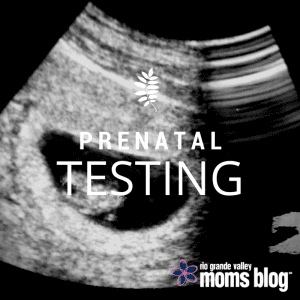I have chosen to do prenatal testing with each of my three pregnancies. My husband’s brother had spina bifida, so we have a higher statistical risk of having a baby with spina bifida. A spina bifida diagnosis could make a difference in the level of prenatal care needed, it might mean choosing a C-section over a vaginal delivery, and I would want to deliver in a hospital with a good NICU. I generally like to be prepared.
None of my children have spina bifida. However, I do have a child with Down syndrome. After he was born, both friends and strangers would ask the question, “Did you know?” And the answer is … no. Not for sure. I had the quad screen done when I was about 16 weeks pregnant. Our results were 1:19 for Down syndrome. We followed up with an ultrasound, opted against the amniocentesis, and waited to meet our baby.
A few years ago, the initial prenatal testing for spina bifida and Down syndrome was done via the triple screen or quad screen – screening tests that analyze maternal blood for certain proteins and then give a ratio for results. For example, a 1:200 ratio indicates that for two hundred women who are pregnant and have the same blood protein levels, chances are good that one will have a child with Down syndrome. Some doctors will deliver the results by saying that the results are “positive” or “negative,” but that is misleading. These tests are NOT diagnostic. 
Doctors usually recommend that an abnormal quad screen result be followed by an amniocentesis or chorionic villus sampling (CVS). These tests are both invasive and diagnostic. The OB/GYN uses a needle to take cells from the placenta (CVS) or amniotic fluid (amniocentesis). The cells are then sent to a lab for genetic analysis. Unlike amniocentesis, CVS cannot detect neural tube defects, such as spina bifida. There is a slight risk of miscarriage with invasive tests.
Recently, a new kind of prenatal test for chromosomal abnormalities has been developed. Non Invasive Prenatal Testing is a simple blood test that analyzes cell-free fetal DNA circulating in maternal blood. Your doctor may offer one of the following tests: MaterniT21, Panorama, verifi, or Harmony. These tests are not invasive; they do not pose any risk to the baby, but they also will not give a diagnosis. However, they are far more accurate than the triple screen or quad screen. Because NIPT are new, they are currently recommended for women who are more likely to have a child with a chromosomal abnormality: women over 35 years old or women who have a family history with chromosomal conditions. NIPT is only used for checking out certain chromosomal issues: trisomies 13, 18 and 21, as well as determining the baby’s sex. You can find more information about NIPT options here.
It is important for a new mom to consider why she might choose to do or decline prenatal screens or testing. Sometimes testing is presented as a matter of course; the doctor regularly screens pregnant women in that practice. Other times, prenatal testing is offered because of specific concerns: a mother’s age or family connection to disability. Whatever the reason, I think it is valuable to ask:
- “What will I do with this information?”
- “Will this knowledge change the care that I (and my baby) receive during my pregnancy?”
- “Will it cause me to worry for the months of pregnancy or will it help me prepare?”
Every mom has her own personality, so testing may not be the right choice for everyone. If you are like me, and you receive abnormal results via prenatal screens or tests, I advise you to seek out good information. OB/GYNs do not receive many hours of training on how to deliver a diagnosis, and many may not have current information about the congenital issue that is affecting your baby. Other people in the doctor’s office may also have their own personal opinions about what choice a mom could make. The intake person that I saw for my first ultrasound suggested that I terminate. Thankfully, the ultrasound technician and the doctor were more professional and did not offer opinions.
Do your own research. Talk to your doctor, a genetics counselor and a pediatrician. I also recommend that you talk to families who have a child with that condition. If you have a Down syndrome diagnosis, I recommend the downloadable brochure at lettercase.org. New technologies and new tests can give us particular information about our babies, but they cannot give us the whole picture.














Do you know where can I get it (nipt) or who can I talk to get one?
You should be able to ask your OB/GYN for a referral for tests. Some common names are: MaterniT21, Panorama and Harmony. I believe that the Maternal Fetal Medicine group at Renaissance offers the testing.